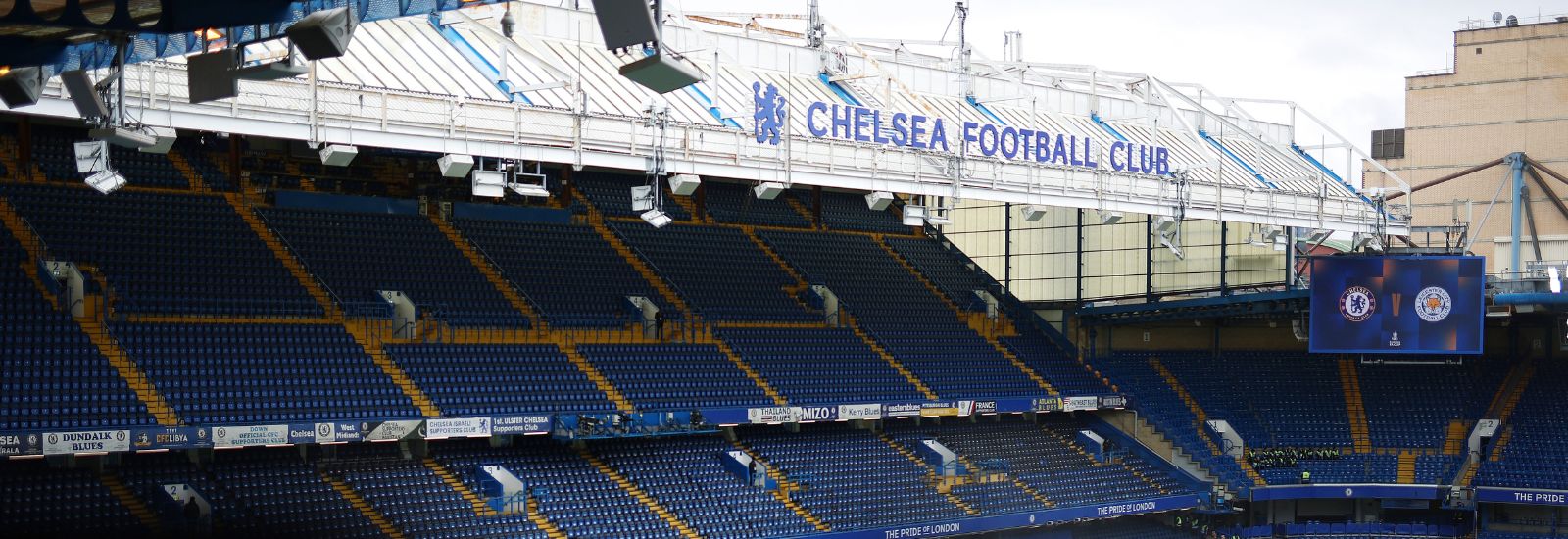Chris Goodwin talks to CONNECTED about his journey from chemistry student to Environmental Social Governance (ESG) Manager at Chelsea Football Club, and the important role sports clubs have to play in the sustainability journey.
 Chris said: “I graduated from Reading with a BSc in Chemistry in 2018 and am now a sustainability professional. I’m so proud to see my university’s emphasis on sustainability. From the climate stripes, to Reading topping the latest People & Planet University League table, it’s so great to see and makes me proud to be a Reading graduate.”
Chris said: “I graduated from Reading with a BSc in Chemistry in 2018 and am now a sustainability professional. I’m so proud to see my university’s emphasis on sustainability. From the climate stripes, to Reading topping the latest People & Planet University League table, it’s so great to see and makes me proud to be a Reading graduate.”
Chris was listed on the edie 30 Under 30 2023, which is a purpose-led community of bold, innovative young professionals who are changing the course of climate action in sustainable business. Chris shares with CONNECTED how the opportunities he was given at Reading have made a profound difference to his career, and how proud he is that his university’s sustainability aims align with his own.
Combining chemistry and sustainability
Chris chose to study chemistry at Reading because it was his favourite subject, but he admits that he didn’t know what his end goal was after graduation.
He said: “I found chemistry fascinating as a topic, but I wasn’t sure what I would do with my degree in terms of my career. It was halfway through my second year when I had a lightbulb moment and everything slotted into place.
“By accident I stumbled into a module lecture on Environmental Chemistry. I had never heard of this before and didn’t know that combining chemistry and environmental studies was an option. I loved it straightaway and I knew immediately this was going to be the focus of my future career.”
Chris then spent a year in industry as part of his degree and, thanks to his lecturers, he managed to secure a placement as an international research student at the University of South Australia. He said: “Living and working in Adelaide for 10 months was an absolute stand-out memory for me and I wouldn’t have achieved this if not for Reading’s help.”
After graduating from Reading Chris got an academic scholarship to the University of York to study an MSc in Green Chemistry and Sustainable Industrial Technology. Following this he worked in Kent, focusing on the extraction of natural hop oils, and then did some environmental consultancy work. But he knew that he wanted to do more and set his sights on becoming a sustainability professional.
He said: “In June 2023 I achieved this goal and became the ESG manager at Chelsea Football Club. I think it’s really important to understand that career paths aren’t always linear – it can be a bit of a rollercoaster to get there, but ultimately I’ve now found myself in the right place.”
The power of sport
Chris’ role at Chelsea is to help lead and deliver the club’s sustainability strategy and Chris believes that sporting professions are uniquely positioned to advocate for, and influence on, issues such as climate change.
 He said: “It’s a pretty far-reaching role, encompassing all water, carbon and energy improvements; engagement and working with local communities; and ensuring we’re compliant with all environmental legislation and keeping abreast of any changes in mandatory reporting.
He said: “It’s a pretty far-reaching role, encompassing all water, carbon and energy improvements; engagement and working with local communities; and ensuring we’re compliant with all environmental legislation and keeping abreast of any changes in mandatory reporting.
“A lot of Premier League football teams have only just started focusing on sustainability and this is a brand new role for Chelsea as well. At the moment I am shaping and moulding our goals and strategy. We’ve already made some good strides at the club, including running our site on 100% renewable electricity and launching our new sustainability policy.”
Chris shares that his new role at Chelsea has been well-received, from both the staff and the fans. He said: “The reception I’ve had from the staff at Chelsea has been fantastic. They seem really glad that the club now has someone dedicated to sustainability and I’ve set up a sustainability working group for our staff to share their ambitions for the business.
“Our fans are really engaged as well – in fact, they are the ones who are challenging the club to do better. We’ve recently had the Green Football Weekend, where different clubs got together to showcase sustainability-related work. During the event at the Kingsmeadow Stadium, we put on a 90% plant-based food menu, reduced the plastic we sold during the game and collected the plastic we couldn’t eliminate on-site afterwards. Fans also played their part by collecting points for their green actions, with a big focus on encouraging people to try more vegetarian meals.
“Everyone is on the sustainability journey together – from our staff and fans all the way up to sports governing bodies. Sustainability in sport needs to be highly collaborative.
“Sport has a voice and the power to take action to address some of the biggest issues we face and to engage people with these issues across the world. I’m looking forward to seeing what we can achieve at Chelsea.”
Finding my place
Chris is enthusiastic about his new role and the part the University of Reading played in helping him to get here.
He said: “It feels like it’s all come together now for me and I’ve found my place. Working in sustainability in sport is such an exciting and developing sector to be in – and it’s only going to need more attention as it’s such critical work. I feel like I’m in the right place at the right time and I’m very driven to learn more and deliver great sustainability initiatives for Chelsea.
“The biggest thing for me is that I’ve gone from working in a laboratory to working in sustainability in sport and I still get to apply everything I learnt during my degree to what I’m doing now. All the hard work has paid off – I’m over the moon to be able to do what I do and I’m so proud of my four years at Reading.”
Find out how the University of Reading is working with its local football club, Reading FC, on a sustainability partnership.
Image credits: Chelsea Football Club







